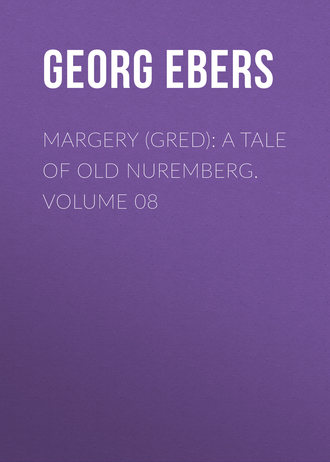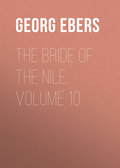
Georg Ebers
Margery (Gred): A Tale Of Old Nuremberg. Volume 08
At Genoa we found many letters full of good tidings of our kindred at home, all overflowing with love and the hope of speedily seeing us there. Hereupon Herdegen could not refrain himself for impatience and, if I had suffered it, he would have ridden onward by day and by night with no pause nor rest, taking fresh horses as he might need them; for my part what I chiefly cared for was to bring him home as fresh and sound as I might, and so preserve Ann from grief of heart. Herdegen had given me her letters to read, and how true and deep a love, how lofty and pure a soul spoke in those lines! Howbeit, when I heard her, as it were, cry out by those letters, how that she longed for the moment when she might again stroke his flowing locks and press his dear faithful hand to her lips as his dutiful maid, my heart beat with fresh fears. He held him more upright, to be sure, and his countenance was less pale and hollow than it had been; but nevermore might he be a strong man. His light eyes were deep in their sockets, his hair was rarer on his head, and there were threads of silver among the gold. Ah, and those luckless hands! It was by reason of his hands—albeit you will doubtless smile at the confession—that I moved him to refrain his longing, even when we were so near our journey's end as Augsburg, and to grant me another day's delay, inasmuch as that I cared most that he should at first hide them in gloves from the womankind at home. And in all the great town was there not a pair to be and that would fit him, and it would take a whole day to make him a pair to his measure. Thus were we fain to tarry, and whereas we had in Augsburg, among other good friends, a faithful ally in trading matters at the Venice Fondaco, Master Sigismund Gossenprot, we lodged in his dwelling, which was one of the finest that fine city; and, as good- hap ruled it, he had, on the very eve of that day, come home from Venice.
He and his worthy wife had known Herdegen of old, and I was cut to the heart to see how the sight of him grieved them both. Nay, and the fair young daughter of the house ne'er cast an eye on the stranger guest, whose presence had been wont to stir every maiden's heart to beat faster. Howbeit, here again I found comfort when I marked at supper that the sweet damsel no longer heeded my simple person, whereas she had at first gazed at me with favor, but hearkened with glowing cheeks to Herdegen's discourse. At first, to be sure, this was anything rather than gay, inasmuch as Master Gossenprot was full of tidings from Venice, and of Sir Franz's latter end, which, indeed, was enough to sadden the most mirthful.
When the Bohemian had come to Venice he had lodged at a tavern, by name "The Mirror," and there mine host had deemed that he was but a gloomy and silent guest. And it fell that one day the city was full of a dreadful uproar, whereas it was rumored that in the afternoon, at the hour when Dame Ursula Giustiniani was wont to fare forth in her gondola, a strange man clad in black had leaped into it from his own and, before the serving-men could lay hands on him, he had stabbed her many times to the heart with his dagger. Then, as they were about to seize him, he had turned the murderous weapon still wet with his victim's blood, on himself, and thus escaped the avenging hand of justice.
As soon as the host of The Mirror heard this tale, he minded him of that strange, dark man and, when that way-farer came not home to his inn, he made report thereof to the judges. Then, on making search in his wallet, it was discovered that he had entered there under a false name, and that it was Sir Franz von Welemisl who had taken such terrible vengeance on Ursula for her sins against himself and Herdegen.
From Augsburg we now made good speed, and when, one fine June morning, our proud old citadel greeted our eyes from afar, and I saw that Herdegen's eyes were wet as he gazed upon it, mine eyes likewise filled with tears, and as we rode we clasped hands fervently, but in silence.
I sent forward a messenger from our last halting-place to give tidings of our coming; and when, hard by Schweinau, behold a cloud of dust, our eyes met and told more than many and eloquent words.
Great and pure and thankful joy filled and bore up my soul; but presently the cloud of dust was hid by a turn in the road behind the trees, and even so, quoth my fearful heart, the shroud of the future hid what next might befall us.
The cruel blows of fate which had fallen on Herdegen had not been all in vain, and the growing weakness of his frame warned him not to spend his strength and eagerness on new and ever new things. Yet what troubled me was that he was not aware of the changes that had come upon him within and without. From all his speech with me I perceived that, even now, he might not conceive that life could be other than as he desired: notwithstanding it gave me secret joy to look upon this dear fellow, for whom life should have had no summer heats nor winter frosts, but only blossoming spring-tide and happy autumn days.
But now we had got round the wood, and we might see what the cloud of dust had concealed. Foremost there came a train of waggons loaded with merchandise and faring southwards, and the first waggon had met a piled- up load of charcoal coming forth from the forest at a place in the road where they were pent between a deep ditch on one hand and thick brushwood and undergrowth on the other; thus neither could turn aside, and their wheels were so fast locked that they barred the road as it had been a wall. Thus the second waggon likewise had come to hurt by the sudden stopping of the first, and it was but hardly saved from turning over into the ditch. There was a scene of wild turmoil. The waggons stopped the way, and neither could the rest of the train, nor their armed outriders, nor our own folks come past, by reason that the ditch was full deep and the underwood thick. We likewise were compelled to draw rein and look on while the six fine waggon horses which had but just come from the stable, their brown coats shining like mirrors, were unharnessed, and likewise the draughtoxen were taken out of the charcoal-waggon; which was done with much noise and cursing, and the brass plates that decked the leathern harness of the big horses jingling so loud and clear that we might not hear the cries of our kinsfolks. Nay, it was the plume in Gotz's hat, towering above the throng, which showed us that they were come.
Now, while Herdegen was vainly urging and spurring his unwilling horse to leap down into the ditch and get round this fortress of waggons, two of the others—and I instantly saw that they were Ann and her father, on horseback—had made their way close to the charcoal waggon; howbeit, they could get no further by reason that it had lurched half over and strewed the way with black charcoal-sacks.
My heart beat as though it would crack, and lo, as I looked round to point them out to Herdegen, he had put forth his last strength to make his horse take the leap, and could scarce hold himself in the saddle; his anguish of mind, and the foolish struggle with the wilful horse, had exhausted the strength of his sickly frame. His face was pale and his breath came hard as he sat there, on the edge of the ditch, and held his great hand to his breast as though he were in pain. Hereupon I likewise felt a deep pang of unspeakable torment, albeit I knew from experience that for such ills there was no remedy but perfect rest. I looked away from him and beheld, a little nearer now, Ann high on her saddle, diligently waving her kerchief, and at her side her father, lifting his councillor's hat.
In a few moments we were united once more. But no….
As I wrote the foregoing words with a trembling hand I vowed that I would set down nought but the truth and the whole truth. And inasmuch as I have not shrunk from making mention of certain matters which many will deem of small honor to Herdegen, who was, by the favor of Heaven, so far more highly graced in all ways than I, who have never been other than middling gifted, it would ill-become me to shrink from relating matters whereof I myself have lived to repent.
There, by the ditch, was my dear only brother, weary and pale, a man marked for an early grave; and in front of me, within a few paces, the woman to whom my heart's only and fervent love had been given even as a child. She sat like a King's daughter on a noble white horse with rich trappings. A magnificent garment of fine cloth, richly broidered with Flanders velvet, flowed about her slender body. The color thereof was white and sapphire-blue, and so likewise were the velvet cap and finely- rounded ostrich feather, which was fastened into it with a brooch of sparkling precious stones. I had always deemed her fairest in sheeny white, and she knew it, while Herdegen had taken blue for his color; and behold she wore both, for love per chance of both brothers. Never had I seen her fairer than at this minute and she had likewise waxed of a buxom comeliness, and how sweet were her red cheeks, and swan-white skin, and ebony-black hair, which flowed out from beneath her little hat in long plaits twined with white and sapphire-blue velvet ribbon.
Never did a maid seem more desirable to a man. And her father on his great brown horse—he was no more a craftsman! In his councillor's robes bordered with fur, with the golden chain round his neck, his well- favored, grave, and manly countenance, and the long, flowing hair down to his shoulders, meseemed he might have been the head of some ancient and noble family. None in Nuremberg might compare with these two for manly dignity and womanly beauty, and was that sickly, bent horseman by the ditch worthy of them? "No, no," cried a voice in my heart. "Yes, Yes!" cried another; and in the midst of this struggle I could but say to myself: "He has an old and good right to her, and as soon as he has found breath he will claim it."
But she? What will she do; how will she demean her; is she aware of his presence? Will she shrink from him as Dame Gossenprot did at Augsburg, and the inn-keeper's smart wife at Ingolstadt, who of old was so over- eager to be at his service? Would Ann, who had rejected many a lordly suitor, be as sweet as of yore to that breathless creature? And if she were to follow the example which he long since set her, if she now cut the bond which he of old had snatched asunder, or if—Merciful Virgin!– if his sickness should increase, and he himself should shrink from fettering her blooming young life to his own—then, oh, then it might be my turn, then ….
And on a sudden there was a cry from the depths of my heart, but heard by none: "Look on this side. Look on me, my one and only beloved! Turn from him who once turned from thee, and hearken to Kunz who loves thee with a more faithful and fervent love than that man, who to this day knows not what thy true worth is, whose heart is as fickle as mine is honest and true. Here I stand, a strong and stalwart man, the friend of every good man, willing and able to carry you in my strong hands through a life crowned with wealth and happiness!"
And while the voice of the Evil One whispered this and much more, my gaze, meseemed, was spellbound to her countenance, and the light of her eyes from afar shone deep into mine. And on a sudden I flung up my arms and, without knowing what I did, stretched them forth, as though beside myself, towards that hotly-loved maiden. Whether she saw this or no I may never learn. And the grace of the Blessed Virgin or of my guardian Saint, preserved me from evil and disgrace, for whereas all that was in me yearned for that beloved one, a clear voice called to me by name, and when I turned, behold it was Margery, who had leaped her light palfrey into the ditch and now had sprung up the grassy bank. It was a breakneck piece of horsemanship, to which she had been driven by longing and sisterly love; and behind her came a man, my cousin Gotz, whose newly- married wife's daring leap was indeed after his own heart. One more plunge, and their horses were on the highroad, and I had lifted Margery out of her saddle and we held each other clasped, stammering out foolish disconnected words, while we first laughed and then wept.
This went on for some while till I was startled by an outcry, and behold, Eppelein, in his impatience to greet his dear master, had been fain to do as Margery and Gotz had done, but with less good fortune, inasmuch as that he had fallen under his horse, which had rolled over with him. His lamentable outcry told me that he needed help, and once more in my life I fulfilled my strange fate, which has ever been to cast to the winds that for which my soul most longed, for another to take it up. While Margery turned to greet Herdegen I hastened down the bank to rescue the faithful fellow who had endured so much in my brother's service, ere the worst should befall him.
And this, with no small pains, I was able to do; and when I was aware that he had suffered no mortal hurt, I clambered up on to the road again, and then once more my heart began to beat sadly. Ann and Herdegen had met again, and once for all. How was she able to refrain herself as she beheld the changed countenance of her lover, and to be mistress of her horror and dismay?
Now, when I had climbed the bank with some pains, in my heavy riding- boots, I saw that the waggon-men had harnessed the six brown horses to their cart once more, and behind them, on the skirt of the wood, were the pair that I sought; and as I went nearer to them Ann had drawn the glove, for which we had tarried so long in Augsburg, from off her lover's battered right hand, and was gazing at it lovingly, with no sign of horror, but with tears in her eyes; and she cried as she kissed it again and again: "Oh, that poor, dear, beloved hand, how cruelly it has suffered, how hard it must have tolled! And that? That is where the blue brand-mark was set? But it is almost gone. And it is in my color, blue, our favorite sapphire-blue!" And she pointed joyously to her goodly array, and she confessed that it was for him alone, that he might see from afar how well she loved and honored him, that she had arrayed herself in the color of fidelity in which he had ever best loved to see her. And he clasped her to him, and when she kissed his thin, streaked hair, and spoke of those dear flowing curls, to which love and care would restore their beauty, I swore a solemn vow before God that I would never look on the union of Herdegen and Ann but with thanksgiving and without envy, and ever do all that in me lay for those two and for their welfare.
Of the glad meeting with our other kith and kin I will say nought. As to Cousin Maud, she had remained at home to welcome her darling at the gate of the Schopperhof, which she had decked forth bravely. Yea, her warm heart beat more fondly for him than for us. She could not wholly conceal her dismay at seeing him so changed. She would stroke him from time to time with a cherishing hand, yet she went about him as though there were somewhat in him of which she was afeard.
Howbeit, in the evening it was with her as it had been with me in the land of Egypt, and she found him again for whom her heart yearned so faithfully. Now, that which had seemed lacking came to light once more, and from that hour she no longer grieved for what he had lost and which a true mother peradventure might never have missed; indeed as his bodily health failed, and she shared the care of tending him with Ann, none could have conceived that he was not verily and indeed her own son.
The evil monster which had crept into my brother's breast grew, thank Heaven, but slowly; and when the young pair had been wed, with a right splendid feast, and my brother had taken Ann home to the Schoppers' house as his dear wife, a glad hope rose up in me that Master Knorr had taken an over-gloomy view of the matter, and that Herdegen might blossom again into new strength and his old hearty health. Howbeit it was but his heart's gladness which lent him so brave and glad an aspect; the sickness must have its course, and it was as it were a serpent, gnawing silently at my joy in life, and its bite was all the more cruel by reason that I might tell no man what it was that hurt me save the old Waldstromers. But they likewise grew young again after their son's homecoming, and notwithstanding her feeble frame, Aunt Jacoba saw Margery's eldest son grow to be six years of age. And she sent him his packet of sweetmeats the first day he went to school; but when the little lad went to thank his grandmother, the old dame was gone to her rest; and her husband lived after her no more than a few months.
One grief only had darkened the latter days of this venerable pair, in truth it was a heavy one; it was the death of my dear brother Herdegen, which befell at the end of the fifth year after he was happily married.
At the end of the fourth year his sickness came upon him with more violence, yet he went forth and back, and ever hoped to be healed, even when he took to his bed four weeks before the end.
On the very last day, on a certain fine evening in May, it was that he said to Ann: "Hearken, my treasure, I am surely better! On the day after tomorrow we will go forth into the sweet Spring, to hear Dame Nightingale who is singing already, and to see Margery. Oh, out in the forest breezes blow to heal the sick!"
Yet they went not; two hours later he had departed this life. By ill fortune at that very time I was at Venice on a matter of business, and when the tidings came to me that my only beloved brother was dead, meseemed as though half my being were torn away, aye, and the nobler and better half; that part which was not content to grieve and care for none but earthly estate and for all that cometh up and passeth away here below, but which hath a position in the bliss of another world, where we ask not only of what use and to what end this or that may be, as I have ever done in my narrow soul.
When Herdegen's eyes closed in death, my wings were broken as it were; with him I lost the highest aim and end of all my labors. For five hard years had I toiled and struggled, often turning night into day, and not for myself, but for him and his, ever upheld and sped forward by the sight of his high soul and great happiness. Our grand-uncle Im Hoff had left me his house and the conduct of his trade, as you have learned already from Margery's little book; and during my long journeyings many matters had not been done to my contentment, and the sick old man had taken out overmuch moneys from the business. A goodly sum came to us from our parents' estate, and my brother and sister and Cousin Maud were fain to entrust me with theirs; but how much I had to do in return!
Moreover a great care came upon me from without, by reason that Sir Franz's kin and heirs refused to repay the moneys for the ransom which Master Michieli of Venice had laid down, and for which Herdegen and I had been sureties. Albeit in this matter we had applied to the law, we might not suffer Michieli to come to loss by reason of his generosity, so I took upon me the whole debt, and that was a hard matter in those times and in my case; and the fifteen thousand ducats which were repaid me by judgment of law, thirty years afterwards, made me small amends, inasmuch as by that time I had long been wont to reckon with much greater sums.
I made good my friend's payment of Herdegen's ransom to the last farthing; yet what pressed me most hardly, so long as my brother lived, was his housekeeping; few indeed in Nuremberg could have spent more.
My eldest brother was the only one of us three who might keep any remembrance of our father, whose trade with Venice and Flanders had yielded great profits, and he could yet mind him how full the house had ever been of guests, and the stables of horses. Now, therefor, he was fain to live on the same wise, and this he deemed was right and seemly, inasmuch as he took the moneys which I gave him as half the clear profits of the Im Hoff trade, which were his by right. And I was fain to suffer him to enjoy that belief, albeit at that time concerns looked but badly. It was I, not he, whose part it was to care for those concerns; and I rejoiced with all my heart when he and his lovely young wife rode forth in such bravery, when he sat as host at the head of a table well- furnished with guests, and won all hearts by his lofty and fiery spirit, which conquered even the least well-disposed. Yet was it not easy to supply that which was needed, or to refrain from speech or reproof when, for instance, my brother must need have from the land of Egypt for Ann such another noble horse as the Emirs there are wont to ride. Or could I require him to pay when, after that Heaven had blessed him with a first born child, Herdegen, radiant with pride and joy, showed me a cradle all of ivory overlaid with costly carved work which he had commanded to be wrought for his darling by the most skilled master known far and wide, for a sum which at that time would have purchased a small house? Albeit it was nigh upon quarter day, I would have taken this and much more upon me rather than have quenched his heart's great gladness; and when I saw thee, Margery the younger, who art now thyself a grandmother, sleeping like a king's daughter in that precious cradle, and perceived with how great joy it filled thy parents to have their jewel in so costly a bed, I rejoiced over my own patience.
It did my heart good, though I spoke not, to hear the Schoppers' house praised as the friendliest in all Nuremberg; yet at other times meseemed I saw shame and poverty standing at the door; and whereas, indeed, those years of magnificence, which for sure were the hardest in all my life, came to no evil issue, I owe this, next to Heaven's grace, to the trust which many folks in Nuremberg placed in my honesty and judgment, far beyond my desert. And when once, not long before my brother's over-early death, I found myself to the very brow in water, as it were, it was that faithfulest of all faithful friends, Uncle Christian Pfinzing, who read the care in my eyes and face during the very last great banquet at Herdegen's table, and led me into the oriel bay, and offered me all his substance; and this is a goodly sum indeed and saved my trade from shipwreck.






